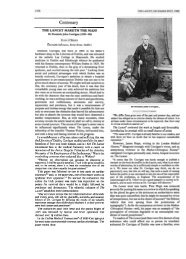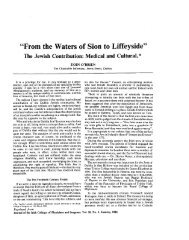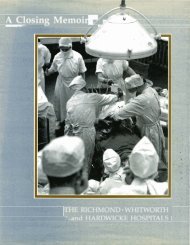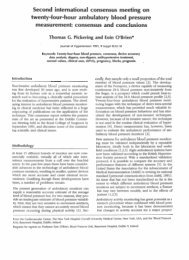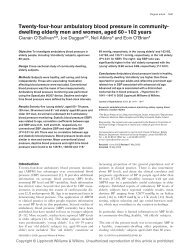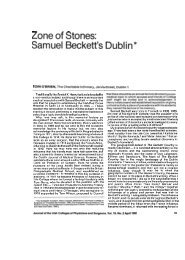- Page 2 and 3: A Century of Service
- Page 4 and 5: A Century of Service The City of Du
- Page 6 and 7: Contents Acknowledgements viii Cent
- Page 8 and 9: Peter O’Flanagan, Chairman of the
- Page 10 and 11: Matthew O’Brien, Chairman of the
- Page 12 and 13: Hugh Brady, President of University
- Page 14 and 15: Introduction It is some twenty year
- Page 16 and 17: CHAPTER ONE The Voluntary Hospital
- Page 18 and 19: The Voluntary Hospital Movement and
- Page 20 and 21: Medical Education The Voluntary Hos
- Page 22 and 23: The Voluntary Hospital Movement and
- Page 24 and 25: John Cheyne The Voluntary Hospital
- Page 26 and 27: The Voluntary Hospital Movement and
- Page 28 and 29: The Voluntary Hospital Movement and
- Page 30 and 31: The Voluntary Hospital Movement and
- Page 32 and 33: The Voluntary Hospital Movement and
- Page 34 and 35: The Voluntary Hospital Movement and
- Page 36 and 37: The Voluntary Hospital Movement and
- Page 38 and 39: The Voluntary Hospital Movement and
- Page 40 and 41: The Voluntary Hospital Movement and
- Page 42 and 43: The Voluntary Hospital Movement and
- Page 44 and 45: The Voluntary Hospital Movement and
- Page 46 and 47: The Voluntary Hospital Movement and
- Page 48 and 49: The Voluntary Hospital Movement and
- Page 52 and 53: The Voluntary Hospital Movement and
- Page 54 and 55: The Voluntary Hospital Movement and
- Page 56 and 57: The Voluntary Hospital Movement and
- Page 58 and 59: The Voluntary Hospital Movement and
- Page 60 and 61: CHAPTER TWO Hume Street and times p
- Page 62 and 63: A love and appreciation for buildin
- Page 64 and 65: fated Robert Emmet, and the Countes
- Page 66 and 67: Gogarty’s house. 15 Ely Place. Wa
- Page 68 and 69: When Gogarty died in New York in 19
- Page 70 and 71: She was a morsel passing sweet And
- Page 72 and 73: Stoker and Robert Woods had a disag
- Page 74 and 75: He became a very successful surgeon
- Page 76 and 77: from a turnip, looking out of aston
- Page 78 and 79: Hume Street notoriety The nineteen
- Page 80 and 81: uildings were lost, the developer e
- Page 82 and 83: CHAPTER THREE A Hospital struggles
- Page 84 and 85: The extent to which people have, an
- Page 86 and 87: Nos 3 and 4 Hume Street Ely Place p
- Page 88 and 89: have been preserved in such an inte
- Page 90 and 91: Andrew Charles received his medical
- Page 92 and 93: the different types of cancer were
- Page 94 and 95: that he never missed a meeting betw
- Page 96 and 97: The Charter became effective on 14t
- Page 98 and 99: Honorary Life Governor in appreciat
- Page 100 and 101:
From statistics that I have had an
- Page 102 and 103:
the melancholy and untimely deaths
- Page 104 and 105:
per cent in 1939 56 to a remarkable
- Page 106 and 107:
A Hospital struggles to succeed (19
- Page 108 and 109:
monitor the effect of therapy. He w
- Page 110 and 111:
An unfortunate debacle: Gogarty ver
- Page 112 and 113:
For the next stage in the controver
- Page 114 and 115:
for its financial governance and Ch
- Page 116 and 117:
ecognition for inclusion in the Hos
- Page 118 and 119:
The statement that when the Corpora
- Page 120 and 121:
Death of Andrew Charles On March 2n
- Page 122 and 123:
presumably in preparation for her m
- Page 124 and 125:
CHAPTER FOUR Stability and service
- Page 126 and 127:
The Accounts for the year ending 31
- Page 128 and 129:
sum. But, we have now learned that
- Page 130 and 131:
And yet the Hospital continued to a
- Page 132 and 133:
The hospital buildings consist of N
- Page 134 and 135:
I think within the last three years
- Page 136 and 137:
Meanwhile, the work done by the Hum
- Page 138 and 139:
advise the Department of Health on
- Page 140 and 141:
only right, even if I digress, to p
- Page 142 and 143:
Ophthalmologist. Miss Joan O’Sull
- Page 144 and 145:
Philip Walker, himself a man of abu
- Page 146 and 147:
In keeping with the sense of togeth
- Page 148 and 149:
facilities available for the care o
- Page 150 and 151:
The remarkable standing which Hume
- Page 152 and 153:
specialists by their general practi
- Page 154 and 155:
adiation on cells, mentioned in my
- Page 156 and 157:
are in the hands of the Ladies Guil
- Page 158 and 159:
143 Stability and service (1946-197
- Page 160 and 161:
145 Stability and service (1946-197
- Page 162 and 163:
T he CHAPTER FIVE A hospital in dec
- Page 164 and 165:
The Minister of State, Sean Moore,
- Page 166 and 167:
discipline that constituted the dua
- Page 168 and 169:
As always in Hume Street, nursing w
- Page 170 and 171:
The refusal of the Board to face re
- Page 172 and 173:
Richmond Hospital to form Beaumont
- Page 174 and 175:
Hospital staircase 159 A hospital i
- Page 176 and 177:
death, to serve the hospital as a m
- Page 178 and 179:
Guild functions. She is sadly misse
- Page 180 and 181:
Hospital, who outlined his experien
- Page 182 and 183:
You will be aware of the recent adv
- Page 184 and 185:
CHAPTER SIX A new vision: bringing
- Page 186 and 187:
The smooth transition of the staff
- Page 188 and 189:
specialising in skin diseases to be
- Page 190 and 191:
The Chairman was then able to lay t
- Page 192 and 193:
The bringing of the vision from con
- Page 194 and 195:
UCD is ideally placed to partner wi
- Page 196 and 197:
This institute, to be known as the
- Page 198 and 199:
Mr. Peter O’Flanagan, Chair of th
- Page 200 and 201:
185 Bringing science to society The
- Page 202 and 203:
187 Bringing science to society The
- Page 204 and 205:
A laboratory in the Charles Institu
- Page 206 and 207:
Apart from considering funding derm
- Page 208 and 209:
Practitioners, the Irish Dermatolog
- Page 210 and 211:
APPENDIX 1 Medical Staff Memoirs TH
- Page 212 and 213:
TO THE GREATER GLORY OF GOD and In
- Page 214 and 215:
These were among those who contribu
- Page 216 and 217:
who teaches in the School in of Art
- Page 218 and 219:
Doctors who met her briefly could n
- Page 220 and 221:
My mother was also a native of Midl
- Page 222 and 223:
still in his early twenties, he joi
- Page 224 and 225:
in a hospital in England. Realising
- Page 226 and 227:
him two years ago) entertained thei
- Page 228 and 229:
the admiring sympathy of his ophtha
- Page 230 and 231:
He was elected hon. FRCSI (1974), a
- Page 232 and 233:
APPENDIX 2 Board of Management Memo
- Page 234 and 235:
these air raids continuing there wa
- Page 236 and 237:
Eamonn Quinn was succeeded on the B
- Page 238 and 239:
Club and Malahide Cricket Club (in
- Page 240 and 241:
Hospital during the war. Ralph was
- Page 242 and 243:
and content throughout its history
- Page 244 and 245:
APPENDIX 3 Dr. Wallace and Dublin
- Page 246 and 247:
The hospital, which was named The D
- Page 248 and 249:
On December 2nd 1837, Wallace atten
- Page 250 and 251:
APPENDIX 4 Miscellaneous Documents
- Page 252 and 253:
learn. It is important to know that
- Page 254 and 255:
Similarly the recognition of the ba
- Page 256 and 257:
cells, intensive X-rays cause a spe
- Page 258 and 259:
Royal College of Surgeons - they ar
- Page 260 and 261:
ecause I am aware of how carefully
- Page 262 and 263:
for her marriage to my father, we f
- Page 264 and 265:
These proposals were summarised in
- Page 266 and 267:
In October 2006 we set up a sub-com
- Page 268 and 269:
If we had immediate accommodation y
- Page 270 and 271:
255 Miscellaneous Documents
- Page 272 and 273:
APPENDIX 5 City of Dublin Skin and
- Page 274 and 275:
2.2 words denoting any gender inclu
- Page 276 and 277:
4.12 To undertake, execute and perf
- Page 278 and 279:
7. INVESTMENT POWERS City of Dublin
- Page 280 and 281:
shall be deemed to be re-elected to
- Page 282 and 283:
City of Dublin Skin and Cancer Hosp
- Page 284 and 285:
18.8 A firm or other unincorporated
- Page 286 and 287:
20. PROCEEDINGS AT GENERAL MEETINGS
- Page 288 and 289:
21. VOTES OF MEMBERS City of Dublin
- Page 290 and 291:
APPENDIX 6 Articles and Memorandum
- Page 292 and 293:
Articles and Memorandum of the Iris
- Page 294 and 295:
(e) fees, remuneration or other ben
- Page 296 and 297:
“Secretary” shall mean any pers
- Page 298 and 299:
(4) If he shall fail to perform any
- Page 300 and 301:
Articles and Memorandum of the Iris
- Page 302 and 303:
Signed this day of 20 This form is
- Page 304 and 305:
interest which is material or a dut
- Page 306 and 307:
60. For the purpose of these Articl
- Page 308 and 309:
(c) the assets and liabilities of t
- Page 310 and 311:
1911/19 J T Wood-Latimer 1919/19 E
- Page 312 and 313:
Mrs. F Lovegrove Mrs. B Lovegrove M
- Page 314 and 315:
MEDICAL STAFF X-Ray Therapeutist/Ra
- Page 316 and 317:
List of Illustrations Andrew Charle
- Page 318 and 319:
303 List of Illustrations An aerial
- Page 320 and 321:
305 References 17. Cameron, C.A., H
- Page 322 and 323:
307 References 87. Corrigan, D.,
- Page 324 and 325:
309 References 8. Irish Times 1911.
- Page 326 and 327:
311 References 56. City of Dublin S
- Page 328 and 329:
313 References 20. City of Dublin S
- Page 330 and 331:
315 References Among other permanen
- Page 332 and 333:
Charles, Iris 140, 161, 162, 163, 1
- Page 334 and 335:
Lutyens, Edwin 52 Lynch, John 185 L



